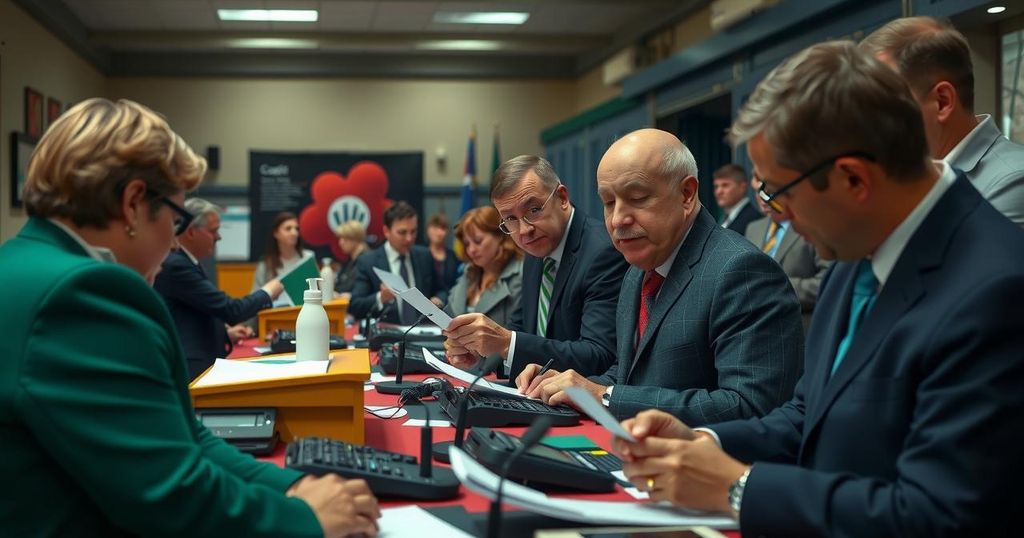World news
AFRICA, AP, BALLINLOUGH, BEECHWOOD PARK, BRIAN LAWLESS, BURKINA FASO, CORK, COUNTY WICKLOW, DEFENCE, DELGANY, DELGANY NATIONAL SCHOOL, DUBLIN, ELECTION, EUROPE, FIA, FIANNA FAIL, FINE, FINE GAEL, GOLA, GOVERNMENT, GOVERNMENT BUILDINGS, IRELAND, ISLAND OF GOLA, JACOB KING, LOCAL NEWS, NEWS, NIALL CARSON, PA, PARLIAMENTARY SEATS, PETER MORRISON, SCHOOL, SIMON HARRIS, SINN FEIN, ST ANTHONY ’ S BOYS ’ SCHOOL
David O'Sullivan
0 Comments
Counting Commences in Ireland’s 2024 General Election Amid Party Rivalries
Counting in Ireland’s General Election indicates a close contest among Fine Gael, Fianna Fail, and Sinn Fein, based on exit polls. Support is nearly evenly distributed among these parties, with significant implications for potential coalitions. The election reflects pressing issues, such as the cost-of-living crisis, and may signal critical changes in Ireland’s political landscape.
In Ireland’s 2024 General Election, vote counting commenced amidst a highly competitive atmosphere as the three leading political parties compete for dominance. The initial exit poll suggests a tightly contested election, with support fragmented among Fine Gael, Fianna Fail, and Sinn Fein, alongside various smaller parties and independents. Counting began Saturday morning, with results expected to emerge over an extended period due to the intricacies of Ireland’s proportional representation voting system, which requires voters to rank candidates by preference.
The exit poll indicates that Fine Gael is the preferred choice for 21% of voters, closely followed by Sinn Fein at 21.1% and Fianna Fail at 19.5%. However, these polling figures alone do not determine which parties will successfully form the next government. Analysts speculate that the outcome may reflect global political trends whereby incumbents face backlash due to economic and social issues prevalent in recent years. Dominating topics in the election campaign included the ongoing housing crisis and the complexities surrounding immigration.
Having ruled Ireland for the past century, Fine Gael and Fianna Fail, though rival factions with historical roots tracing back to the civil war of the 1920s, may aim to form another coalition government, needing collaboration with smaller parties or independents to secure a majority. Sinn Fein, having achieved notable success in the 2020 election but subsequently being excluded from governance due to its leftist stance and historical affiliations, now contests strongly for leadership.
Despite Sinn Fein’s appeal for change resonating with many voters, both Fine Gael and Fianna Fail have reiterated their reluctance to enter into a coalition with them. As cited, “There is every chance that Sinn Fein will emerge from these elections as the largest political party,” expressed Matt Carthy, Sinn Fein’s director of elections.
Looking ahead, the election results may signify significant shifts in Ireland’s political landscape and reflect broader international patterns affecting governing bodies across the globe.
Ireland’s political history is characterized by a longstanding rivalry between the two dominant parties, Fine Gael and Fianna Fail, both of which emerged from opposing factions during the civil war in the 1920s. The upcoming General Election is particularly crucial as it reflects not only the current public sentiment but also the ramifications of past governance amid crises such as the cost-of-living and housing challenges. Since the last election in 2020, Sinn Fein experienced a rise in popularity yet remained isolated from forming a government due to the longstanding opposition from the two main parties, leading to an evolving political narrative in the country as voters seek new representation.
The 2024 General Election in Ireland marks a pivotal moment in the nation’s political evolution, shaped by public dissatisfaction and the need for effective governance amid pressing social issues. With the counting of votes underway and initial polls indicating a competitive landscape among the leading parties, the coming days will be crucial in determining Ireland’s political future and potential shifts in coalition dynamics among them. The outcomes may well challenge past norms and reignite discussions surrounding governance, representation, and the role of emerging parties in an evolving democratic framework.
Original Source: apnews.com




Post Comment